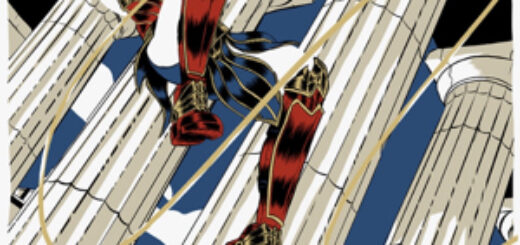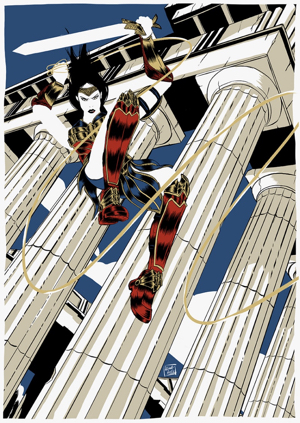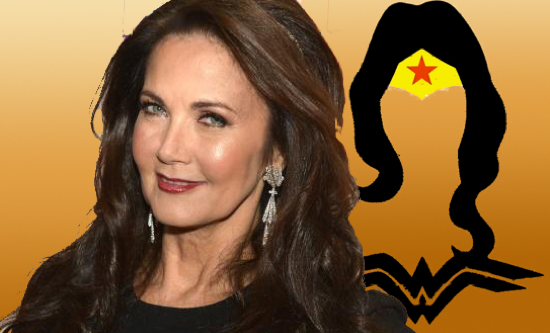Baby mine, don’t you cry. / Baby mine, dry your eyes. / Rest your head close to my heart, never to part, / Baby of mine. • From Walt Disney’s “Dumbo”(1941), Words and Lyrics by Frank Churchill and Ned Washington
So Donna Troy is coming back.
Only this isn’t the vibrant, intelligent, powerful, and oh-so-very human – with all the foibles and strengths inherent in homo sapiens – young woman that I came to know and love back in the day when Marv Wolfman and George Pérez created and collaborated on The New Teen Titans.
This is a Donna created through the teamwork of Meredith and David Finch, who has been granted life through the dark arts, through black magic, and as she rises naked from the brewing miasma of a black cauldron, and so we react with fear and horror, our intrinsic fear of human sacrifice, blood ritual, and “unnatural” life causing us to recoil in horror and to whisper a psalm of David, to cross ourselves in supplication to God, to ward off this, this thing with shaking hands making patterns in the air, signs and symbols as ancient and as useless as our dead forefathers who huddled in fear on the plains of Africa as the light left the world and the darkness arose.
This thing is something forged in fire and brimstone. This thing is evil personified. This thing is wickedness beyond redemption.
This thing is sin come to life.
Yet once there was a woman, whose soul was dying from longing. Yet once there was a woman whose arms reached to hold nothing but empty air. Yet once there was a woman whose life was desolate with the silence of her home. And so this woman prayed to her gods for relief from this sorrowful existence, begged them to release her from her solitary misery.
She fasted in repentance; she washed only enough to ward off evil odor; and she put off wearing colors and smooth satins and silk, and dressed herself in haircloth and solemn hues. She ate sparingly, only enough to keep her alive, and took the bounties of her kitchen to the sick and needy among her sisters. And yet, for so long that Queen Hippolyta of Themiscrya lost track of the days, months, and years of her travail, the gods were silent.
And her Amazons whispered behind her back, and some thought that she must be overthrown, for she was mad, they said, and death will come to us all in following her, as surely as it did to the daughters of King Cecrops of Athens, who threw themselves from the Acropolis, or into the sea. But others calmed them, saying that the melancholia in their queen’s heart would find respite in their loyalty.
Then, one night the queen had a dream. Hermes, the messenger of the gods, came to her and whispered instructions into her ear. “Do not speak of this to anyone,” the winged herald said. “For if you do the gods will turn away from you and your life, such as it is, will continue in solitude as you watch your sisters and this paradise come to enmity and fall into entropy and chaos.
That morning the queen bathed once again in the milk of heifers, and had her attendants clothe her in the magnificence that was her due. She perfumed herself with the musk of roses and broke her fast with jellied eels and warm bread, and once again slaked her thirst with the waters of the Pool of Life. Her attendants asked her many questions, but, remembering the words of Hermes, she silenced them and sent them away.
Alone now, Hippolyta made her way to the shores of Paradise Island, where in a hidden cove she stripped herself of her finery. Naked, the queen made absolution to the gods, smearing her face with the mud of the ocean, and also over her womb and breasts. She knelt in the wet sand, and from that same mud formed the figure of a newborn babe.
And she prayed, repeating the words that Hermes had whispered in her dream.
The sky darkened and night fell upon Themiscrya, though it was noon. A cold wind blew and Hippolyta shivered as it battered her naked body. She looked up into the sky and saw that Selene, the goddess of the moon, had eclipsed Helios, the god of the sun, for this was the time of woman.
She looked back down upon the clay figure, and as she did so, she felt her breasts suddenly grow heavy and milk leaked from her nipples. A great pain spasmed through her loins and up into her uterus, and the queen lay down, crying out in a moment of fear as her legs drew up over her stomach and something moved within her body. For what seemed a lifetime Hippolyta lay there on the beach, wracked with pain, unable to stir afraid, sure that she was being punished for her arrogance in not accepting the fate woven for her by the Morai.
“Clotho, Lachesis, Atropos, forgive me,” she groaned. “Forgive my presumption. Allow me to live to serve you and my Amazons.”
There was no answer.
And then there was a light, such a bright golden radiance, so that Hippolyta closed her eyes against it. And there were two voices.
“Do not be afraid, daughter,” said Leto, the goddess of motherhood.
“I am with you, as I am with all women at their time,” said Eileithya, the goddess of childhood.
Hippolyta opened her eyes. The goddesses, bathed in a glow that had no earthly source, stood before her.
“We have heard your prayers,” said Leto.
“And they are answered,” said Eilethya.
Suddenly the queen felt as if a great chariot lay at the doorway of her secret place, that place where no man had touched in so long. She felt, rather than saw, the two goddesses kneel on either side of her, then one was behind her and pushing her up into a sitting position, but taking the weight of Hippolyta upon herself. Opening her eyes, Hippolyta saw the other – was it Eilethya? – crouch before her, a blanket of silver cotton in her hands. “You must push now,” said the goddess. “Lean again Leto. She will be your rock.”
Hippolyta felt as though she was falling off a great cliff. From high above her, she heard the goddesses speak. Their brightness was as a pinprick in the darkness starting to envelop her.
“She will be the greatest of the Amazons, a gift not only to yourself, but to the world, for it is to the world she will belong.”
“A great warrior against the darkness, yet her soul and heart will be full of love,” said Eilethya. “All the glories and gifts of all the gods and goddesses of Olympus will be hers.”
“Her name will be Diana,” said Leto.
Warm salt water was in her nose and her mouth, and Hippolyta sat up with a start. The sun was warm on her hair and shoulders; it was noon, judging from the position of the sun; she was still in the cove, with only the sound of the surf and the cry of seagulls for company. Why had she come here? She had a memory of covering her face and parts of her body with mud, but reaching up to her cheek, there was nothing there except for a few wet grains of sand. She lifted her gown, which was soggy with ocean water. Her body was clean except for a few stray pieces of seaweed on her belly.
The queen shuddered. Had there truly been an eclipse? Had she dreamed it all? Or was she, as she knew many whispered, truly mad?
No.
That wasn’t the sound of seagulls.
A baby was crying somewhere.
But there had been no babies born in Themiscrya for millennia, not since the last children were born to those Amazons who had been raped by the men of Greece and Sparta in that terrible final war. A war which had led Queen Hippolyta – she herself raped by Hercules, though no child had resulted – to lead those surviving sisters who were willing to turn their back on what came to be known as “Man’s World” to Paradise. The immortal island.
The baby – if that was what it was–was still crying. Hippolyta followed the sound with her eyes.
There. Just where the surf met the sand. Something was lying there. Shakily, Hippolyta rose to her feet.
As she did so, she felt a warm gush of liquid spurt from her breasts, staining her gown. And a trickle of blood slid down her inner thigh. As if….
She stared down at the baby. It had black hair, black like the waters of the River Styx, and eyes were a strange green-blue, reflecting the color of the Aegean Sea where it met the Mesogeios.
The queen picked up the infant, who was wrapped in a blanket of very fine and very soft silver.
“Diana,” Hippolyta whispered.
The baby found the mother’s nipple, and nursed.
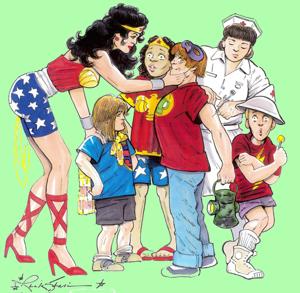 Well, everybody else here is talking about Wonder Woman, so I guess it’s my turn. Caution: there may be S-P-O-I-L-E-R-S ahead! (Especially my sixth bullet, below.)
Well, everybody else here is talking about Wonder Woman, so I guess it’s my turn. Caution: there may be S-P-O-I-L-E-R-S ahead! (Especially my sixth bullet, below.) I loved the portrayal of Themiscrya. Of course I immediately thought of George (Pérez) as I looked upon the architecture and facades of the city; and I also thought of my own work and remembered how, as I wrote, I would picture Diana’s home in my head. (I also thought of Marion Zimmer Bradley’s The Mists of Avalon, another book that also features a mystical island of women.) But it wasn’t just George or my own work or Bradley’s; it was also a callback to my childhood, when I would look at the clouds piling up on the horizon as the sun set, and see castles and waterfalls and NeverNever Land and magic.
I loved the portrayal of Themiscrya. Of course I immediately thought of George (Pérez) as I looked upon the architecture and facades of the city; and I also thought of my own work and remembered how, as I wrote, I would picture Diana’s home in my head. (I also thought of Marion Zimmer Bradley’s The Mists of Avalon, another book that also features a mystical island of women.) But it wasn’t just George or my own work or Bradley’s; it was also a callback to my childhood, when I would look at the clouds piling up on the horizon as the sun set, and see castles and waterfalls and NeverNever Land and magic.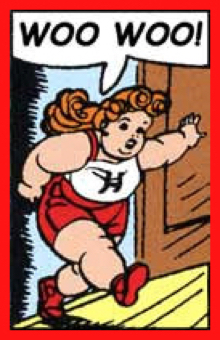 Washington Post: How the Jewish Identity of ‘Wonder Woman’s’ Star is Causing a Stir
Washington Post: How the Jewish Identity of ‘Wonder Woman’s’ Star is Causing a Stir
